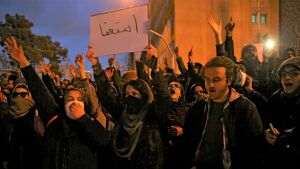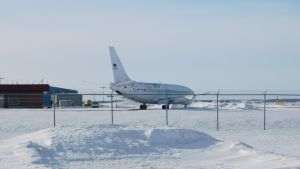
I think I'm going to start keeping a list. There I will drop, to be remembered, the most aberrant statements made by current politicians. And there are plenty of them. But I already know what will be at the top of this list. A statement made these days by Alexander Lukashenko, the dictator of Belarus. (By the way, who "interviews" these people?). Referring to Russian nuclear weapons recently transferred to Belarus, Lukashenko said that if his country was attacked, he would not hesitate, but would immediately launch nuclear weapons from its territory.
You would have believed the guy has other worries. For example, the fact that Belarus ranks 86th in terms of GDP per capita. That is, lower than Armenia (85) or Equatorial Guinea (81). Or that Belarus ranks a miserable 100th in life expectancy, worse than Bangladesh (99th) or North Korea (88th). But if that's what concerns him... to announce that he will drop the bomb if someone upsets him.
I would not have mentioned the aberrations of the Minsk dictator if they did not have a certain meaning. Lukashenko is nothing more than an attack poodle kept on a leash by Moscow dictator Vladimir Putin. The declaration is just a new episode in the nuclear blackmail that the Russian despot keeps trying to address the NATO states.
This is probably the most dangerous statement of its kind since the beginning of the invasion of Ukraine. Readers will, of course, recall the countless nuclear threats that have been made by Russian officials. First among these, Vladimir Putin himself. But the regime in Moscow knows very well that a nuclear weapon launched from Russia will receive a devastating response. So now he is trying to shift the blame to his ally, Belarus. Sort of a "monkey with a razor" strategy.
Russia was inspired in this by its friends, the Chinese Communists. For more than twenty years they have been helping North Korea build an arsenal to directly threaten the United States. The same perverse logic: "It's not us, it's the madman!".
Even more worrying are the reports that seem to indicate that Pyongyang has also received direct Russian support. North Korea recently tested a missile that looks and flies suspiciously similar to the Topol-M, an advanced strategic missile owned by the Russian Federation.
To understand what is happening we need to recap a little history. In 1945 the United States became the world's first nuclear power. From that moment it was known that it was only a matter of time before other states got their hands on the nuclear weapon. But American officials at the time preferred to bury their heads in the sand and hope that the whole matter will go away in a distant future.
During the terms of Roosevelt, Truman and Eisenhower, the United States tried to impose an "arms control" regime. The idea was naive from the start. The USSR detonated the first nuclear weapon in 1949. Other dictatorships, spurred on by the Soviet example, ran to equip themselves with atomic weapons. After all, it was clear that the United States could not stop them.
The first was the People's Republic of China, in 1964. Ironically, back then Communist China played exactly the role Belarus is now playing. It received Soviet technology so that USSR could threaten the free world through intermediaries. It was followed by India in 1974, Pakistan in 1998, and North Korea in 2006. Iran, Iraq, Algeria, Libya and Syria tried their hand. Likewise Argentina and Brazil, while these states were military dictatorships.
During this time, Western democracies were hindering themselves. Or one, the other. It began with the United States, which in 1945 prevented Britain from benefiting from its participation in the nuclear weapons design program. We see here a radically incompetent way of relating to the issue of proliferation. "We do non-proliferation, others only if they want!". Britain managed to acquire nuclear weapons on its own, detonating the first nuclear device in 1952. France followed in 1960.
Since then, however, Western democracies have bowed their heads. They have accepted nuclear proliferation among the world's dictatorships. Sweden gave up its nuclear program in 1972. Japan was pressured by the Americans to declare itself a non-nuclear country. Only Israel, despite fierce opposition from the Americans, went ahead and acquired a nuclear arsenal.
There we are, at the point where two monstrous dictatorships (Russia and the Chinese PR) directly or indirectly threaten the United States and its allies. Does the recipe work? It is difficult to give a final verdict. In Europe, Lukashenko's threats are unlikely to go anywhere in the short term. The situation in Asia is worse, where the North Korean arsenal is at the disposal of a bizarre character with behavioural issues. On both fronts, Moscow and Beijing are pouring gas on the fire.























































